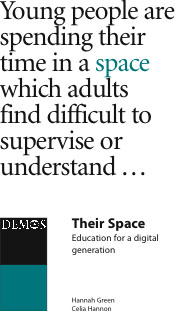UK think tank Demos on education for a digital generation
In a report launched today (Thursday) the influential think tank Demos calls on schools to get past fears about children’s internet use and harness its learning potential.
The report Their Space: Education for a digital generation draws on research showing that a generation of children have made online activity a part of everyday life, with parents and schools still far behind.
The report argues that children are developing a sophisticated understanding of new technologies outside of formal schooling, gaining creative and entrepreneurial skills demanded by the global knowledge economy.
Schools are failing to develop these skills, with many attempting to limit children’s online activity to ICT ‘ghettos’ while banning the use of social networking sites like MySpace and YouTube.
The research, based on nine months of interviews, focus groups and recording children’s online activity, found that:
- A majority of children use new media tools to make their lives easier and strengthen existing friendship networks
- Almost all children are involved in creative production – e.g. uploading/editing photos and building websites
- A smaller group of ‘digital pioneers’ are engaged in more groundbreaking activities
- Children are well aware of potential risks, with many able to self regulate – contrary to popular assumptions about safety
- Many children have their own ‘hierarchy of digital activity’ and are much more conscious of the relative values of online activity than their parents and teachers
The report goes on to make a number of proposals on how formal education in the UK can adapt to the growing dominance of online culture in children’s lives, including the recommendation that children should be given the opportunity to build up a ‘creative portfolio’ alongside traditional forms of assessment, access to which would be determined by the children themselves
– Read press release
– Download report (pdf, 302 kb, 81 pages)
– ‘In class, I have to power down’ [The Guardian]





[…] Il rapporto di Demos “Their Space: Education for a digital generation“, basato su di una ricerca qualitativa con bambini e genitori, afferma il valore positivo dei media digitali per i più piccoli, le cui attività online sono ormai quotidiane. Essi stanno sviluppando una sofisticata capacità di comprensione della tecnologia, maggiore creatività e anche uno spirito imprenditoriale. […]